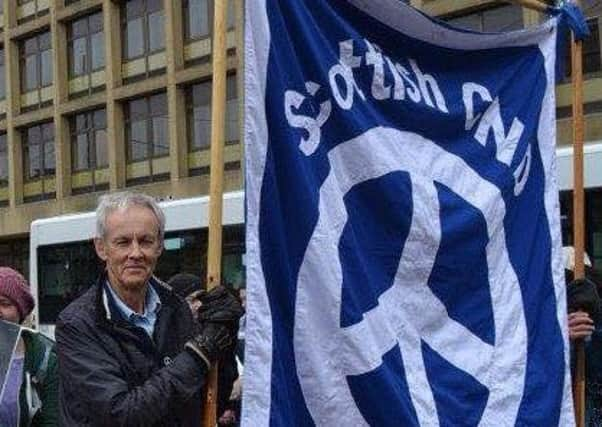Obituary: Dr Alan Mackinnon, Scottish CND chairman and secretary


Alan Mackinnon was a dedicated doctor and leading luminary in the peace movement – generous, principled and influential far beyond his native Scotland.
Shaped by the Communist Party’s commitment to anti-imperialism and peaceful co-existence since his student days, he was a lifelong champion of the causes he believed in, arguing his case firmly but concisely, with clarity and backed by meticulous research.
Advertisement
Hide AdAdvertisement
Hide AdAs chair of the Scottish Campaign for Nuclear Disarmament he co-ordinated protests against the Gulf War in the 1990s and a decade later, following the attack on the World Trade Centre in New York, established the Scottish Coalition for Justice not War, drawing together representatives of a wide range of political parties, trade unions, religious organisations and peace groups, challenging the American response and rallying Scottish opposition to the invasions of Afghanistan and Iraq.
Admired for his tenacity and compassion by a wide spectrum of supporters, from his patients to the new UK Labour leader Jeremy Corbyn, he recently defied the terminal illness that had so disabled him to chair Glasgow’s commemoration of the bombing of Hiroshima, reminding his audience of the medical effects of nuclear weapons.
The son of a pharmacist from Skye, whose Gaelic culture was fostered by the family down the years – his daughter Maeve is an award-winning Gaelic singer – he was born and raised in Glasgow and educated at Hillhead High School before studying medicine at Glasgow University.
He became a member of the Communist Party at university and graduated MB ChB in 1971. A few years later he married Karin, an artist and teacher, and the couple moved to Tanzania where he worked as a doctor.
Returning to Glasgow in 1974, he became a general practitioner in Baillieston, where he would work for 35 years, and began campaigning to improve health services for the East End.
Meanwhile his commitment to the quest for peace would increasingly bring him to prominence and he played a central role in both Scottish CND and in the wider peace movement in Scotland for more than 30 years. He also became involved in numerous political campaigns – including protesting against the Poll Tax and working to support striking miners – and delivered the Morning Star weekly in his neighbourhood of Partick.
He initially became chairman of Scottish CND in 1989, serving until 1992, a period during which he worked with a range of groups to co-ordinate vigils and demonstrations against the Gulf War. He took up the chair again in 2000 and remained in post until 2011. He also helped to lead the Communist Party’s peace and disarmament work when he served on its executive for two terms.
During his leadership of CND north of the Border he rallied opposition to the Trident nuclear weapons programme, was a key member of the Scottish Government’s working group on Scotland Without Nuclear Weapons and edited Scottish CND’s magazine, Nuclear Free Scotland, for many years. He worked with the Scottish Trades Union Congress and other union representatives to present a detailed case on the economic and employment implications of scrapping Trident, arguing that more jobs could be sustained if the money spent on nuclear weapons was diverted to other projects and investigating how to diversify away from defence work. He was one of the authors of a report, Trident and Jobs, published by the STUC and Scottish CND this spring.
Advertisement
Hide AdAdvertisement
Hide AdHe retired as a GP after being diagnosed with cancer but his own illness proved little hindrance to his determination to help others. He went on to train in tropical medicine at Liverpool University and subsequently worked as a doctor with Médecins Sans Frontières in Sierra Leone. It was this experience that prompted him to write features and pamphlets for the Morning Star, the Communist Party and CND, on modern imperialism and the links to the arms race and the expanded remit of Nato across Asia and Africa. His recent publications include Falling Eagle, Rising Dragon: The dangers of a new arms race in the Asia-Pacific region (2013) and Nato Is The Biggest Threat To Peace (2015) produced during his tenure as secretary of Scottish CND.
He also contributed to the Red Paper on Scotland in 2005 and again in 2014 and was a leading figure in bringing together a left-wing alliance during the referendum to campaign for a federal Britain that would maintain the principles of solidarity and redistribution together with a Scottish Parliament with real powers of economic democracy and public ownership.
Despite having had a leg amputated and with his health seriously declining, he continued to write, played an active role in CND’s Vote Out Trident road show during this year’s election campaign and helped out on street stalls during the summer.
Mackinnon spoke at Glasgow’s Hiroshima event on 6 August and was commended for his work by the then front-runner in the contest to lead the UK Labour Party, Jeremy Corbyn, a family friend whom he welcomed into his home during his visit to Glasgow. He lived to see the election of Corbyn who has since continued to champion their joint commitment to end Trident.
In addition to his political and peace campaigning, Mackinnon was also an accomplished musician, performing as drummer with the band the House of Lords in the 1970s and later playing the uilleann pipes.
He is survived by his wife Karin and children Maeve and Ian.